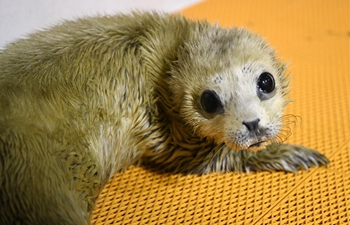WASHINGTON, April 3 (Xinhua) -- American scientists started the clinical trial of a universal influenza vaccine candidate for its safety and ability to induce an immune response in healthy volunteers.
The researchers at the National Institute of Allergy and Infectious Diseases (NIAID), under the U.S. National Institutes of Health, developed the experimental vaccine, which is designed to teach the body to make protective immune responses against diverse influenza subtypes by targeting a portion of the virus that varies relatively little from strain to strain, according to a NIAID press release on Wednesday.
The universal influenza vaccine can provide long-lasting protection for all age groups from multiple influenza subtypes, including those that might cause a pandemic.
"This Phase 1 clinical trial is a step forward in our efforts to develop a durable and broadly protective universal influenza vaccine," said NIAID Director Anthony S. Fauci.
The trial will gradually enroll at least 53 healthy adults aged 18 to 70 years and investigators hope to understand how participants' immune responses to the experimental vaccine may vary based on age and the likelihood of their previous exposure to different influenza variants.
The new vaccine candidate consists only of the stem of hemagglutinin (HA), an influenza protein, on the surface of a microscopic nanoparticle, according to the researchers.
HA, which enables the influenza virus to enter a human cell, is composed of a head and stem region. The HA head constantly changes with a phenomenon called "antigenic drift," so traditional flu vaccines, mostly directed toward the head, must be updated each year.
Scientists predict that targeting the HA stem without the distraction of the HA head could induce broader and longer lasting immunity, so they used the stem of an H1N1 influenza virus to create the candidate vaccine.
The initial data showed that the vaccine platform is safe and well-tolerated in humans.
Also, this H1N1 candidate vaccine protected animals from infection of H5N1, a different influenza subtype, indicating that the antibodies induced by the vaccine can protect against other influenza subtypes within "group 1," including both H1 and H5.
In future clinical trials, the researchers plans to evaluate a vaccine that is designed to protect against "group 2" influenza subtypes, including H3 and H7.












